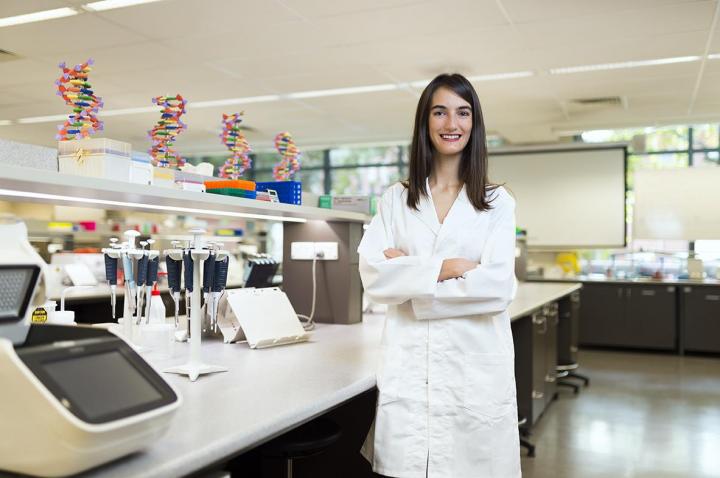Condition causes severe neuro degeneration in infants

Credit: University of South Australia
A team of South Australian researchers has cracked a rare gene variant for a disorder that causes severe neurodegeneration in infants.
The previously baffling condition sees a normal healthy child start to lose muscle tone and motor skills, ultimately losing the capacity to walk and use language. The children go on to experience epileptic encephalopathy and cycles of serious gastric disruption, including severe vomiting.
The condition has an onset at between 12 and 14 months.
Using a genomics approach, where a patient’s entire DNA sequence is examined, University of South Australia PhD student Alicia Byrne made the significant find, identified in just three infants worldwide, two of those in one South Australian family.
“When we started working with this local family, the disorder the children presented with had never been described but since our research began there has been one more case identified,” Byrne says.
“We discovered that the children carried genetic changes which meant they were unable to absorb vital B group vitamins, which are essential for normal development and function of the nervous system.”
While the Adelaide family tragically lost one child to this disorder, with the cause now identified, the family’s paediatric neurologist at the Women’s and Children’s Hospital in Adelaide, Dr Nicholas Smith, and colleagues were able to devise a targeted therapy to overcome the problem.
Dr Smith, a senior lecturer in paediatric medicine at the University of Adelaide, says the treatment has made a huge difference.
“For the family’s second child, weekly injections of the B group vitamins in which he is deficient have been able to halt and even reverse some of the impacts of this devastating disease,” Dr Smith says.
Byrne’s PhD supervisor, UniSA Adjunct Professor at the Centre for Cancer Biology, Hamish Scott says, ironically, rare diseases are actually a broad and significant area of genomics research.
“While a rare genetic disease may only impact a handful of people, what we are quickly understanding in our work on the human genome is that there are myriad different rare diseases,” he says.
“Genomic research opens an important path in identifying and, with strong partnerships such as we have here in South Australia between universities, government and our hospitals, in developing personalised precision medicine to treat rare diseases.”
“In addition, the work we do in understanding genes and how they make the body work, constantly informs human biology and provides deeper understandings of human health that have population-wide relevance.”
“Our goal is to develop genomic testing so that children can be diagnosed at or before birth and treatments can be delivered as early as possible.”
###
Paper link: https:/
Media Contact
Candy Gibson
[email protected]
61-883-020-961
Related Journal Article
http://dx.




